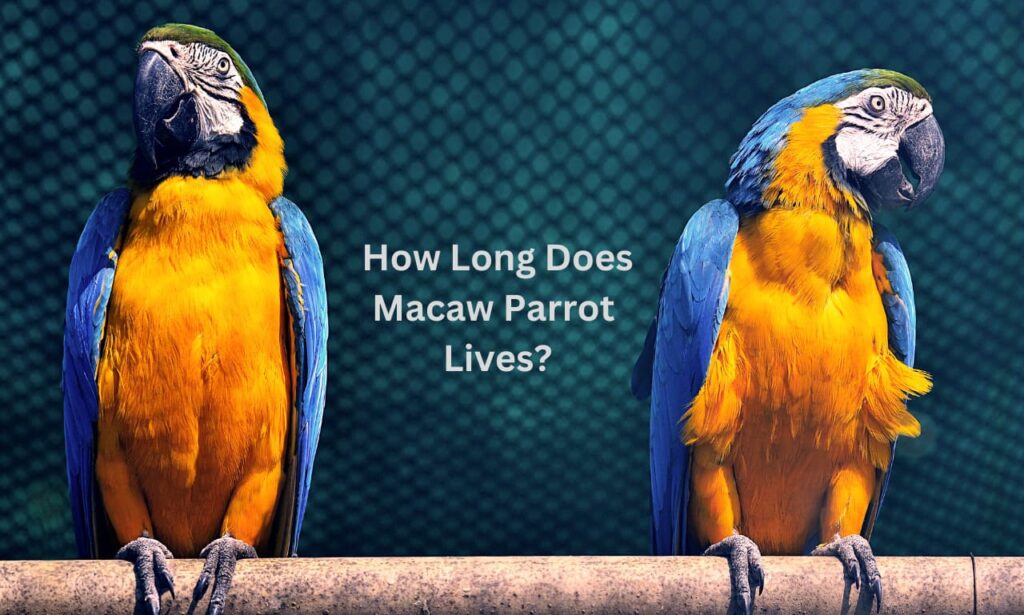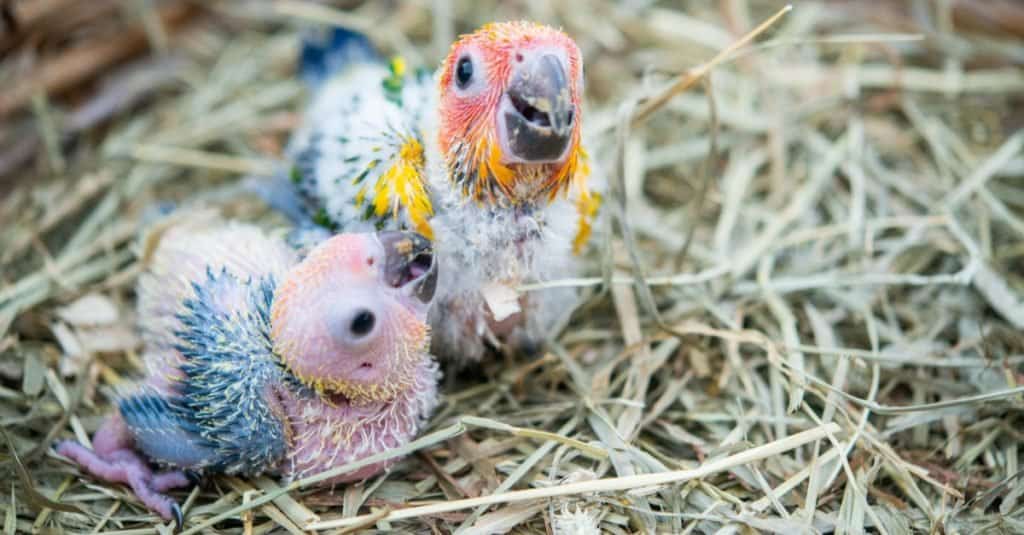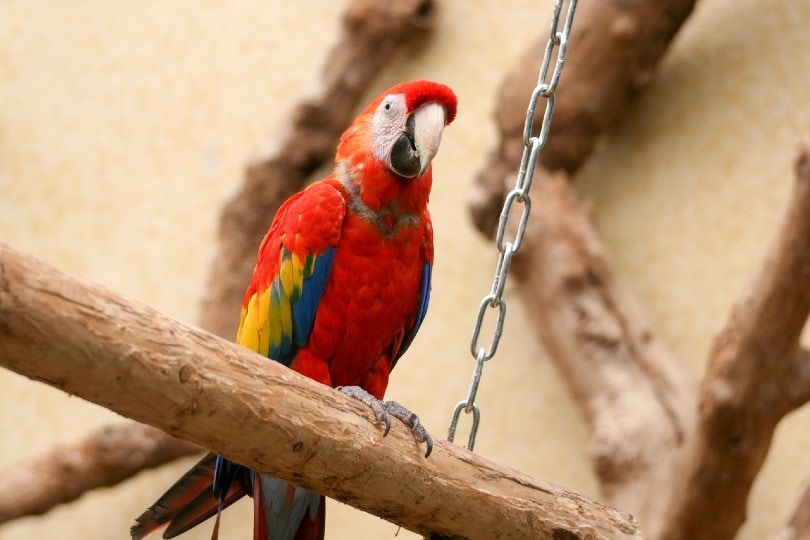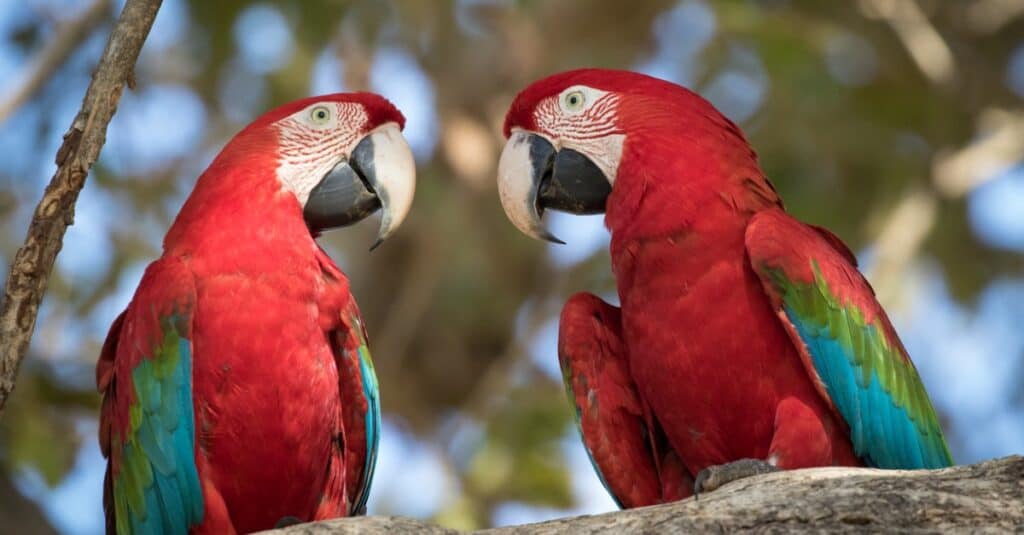If you want to buy a Macaw Parrot, you must know about the Macaw’s Lifespan and how long you must keep them around yourself. Don’t worry; here, we will discuss everything you need to know about lifespan and its related topics. So, Let’s go to the Perfect guide for the Macaw Parrot Lifespan.
The lifespan of macaws is a topic that has fascinated researchers, bird enthusiasts, and pet owners alike. These avian wonders are known for their longevity, often surpassing the lifespans of many other bird species.
In this comprehensive guide, we will embark on a journey to explore the secrets behind the remarkable longevity of macaws. We will delve into their natural habitat, unique biology, and the factors contributing to their extended Macaw Lifespan. Whether you admire these beautiful birds, are a potential pet owner, or are simply curious about the mysteries of avian life, this article will provide invaluable insights and guidance.
How Long Does Macaw Live?

On average, macaw parrots Lifespan have an impressive lifespan of 60 to 80 years in the wild. However, in captivity, where they receive optimal care and nutrition, macaws can live even longer, often reaching 80 to 100 years or more. This exceptional longevity makes macaws one of the longest-living parrot species on the planet. The Place makes a big difference in the macaw lifespan, which is why the macaw parrot species is extended or extended.
Macaw Lifespan in Wild Area
The average lifespan of macaws in their natural habitat can vary depending on species, habitat conditions, and individual circumstances. However, wild macaws generally have an average lifespan of 60 to 80 years. Some macaw species have been known to live even longer. With optimal environmental conditions, access to diverse food sources, and protection from predators, some macaws in the wild have been recorded to live beyond 80 years of age. For Record the Hyacinth Macaw lifespan is around 40 to 50 years old.
It’s important to note that individual variations can occur, and factors like disease, habitat degradation, and human interference can impact their lifespans. Macaw lifespan in the wild highlights their ability to adapt to their natural environment and thrive over extended periods. It also underscores the importance of conservation efforts to protect their habitats, promote breeding success, and ensure their survival for future generations.
Macaw Lifespan in Captivity Area
In captivity, macaws can live even longer than their wild counterparts, thanks to their human caregivers’ optimal care, nutrition, and protection. With proper husbandry and a well-maintained environment, macaws in captivity can potentially exceed their average lifespan in the wild. On average, macaws in captivity can live anywhere from 60 to 80 years or even longer. Many well-cared-for macaws have been known to live well into their 80s or even reach the age of 90 years or more. For record the blue and gold macaw lifespan is around 80 to 100 years.
It’s important to note that the specific lifespan of a Macaw Lifespan in captivity can vary depending on factors such as species, genetics, quality of care, and overall health management. Individual macaws may have different lifespans, even within the same species, due to genetic variations and environmental factors. Responsible macaw ownership involves providing a suitable and enriched environment, a balanced diet, regular veterinary check-ups, and social interaction to ensure their well-being and maximize their lifespan.
Average Macaw Lifecycle

Understanding the lifecycle of a Macaw Lifespan is essential for providing appropriate care and ensuring their well-being throughout different stages of their lives. Let’s explore the average lifecycle of a macaw:
Hatchling Stage (0-12 weeks): The lifecycle of a Macaw Lifespan begins as a hatchling. Macaw chicks are born blind, featherless, and utterly dependent on their parents for nourishment and protection. During this stage, they rely on a specialized diet consisting of regurgitated food their parents provide. They gradually develop feathers and physical strength.
Nestling Stage (12 weeks – 6 months): As macaw chicks grow, they transition from hatchling to nestling. At this point in Macaw Lifespan, they begin exploring their surroundings, developing more vital motor skills, and experimenting with solid foods. Macaw parents continue to provide care and nourishment, teaching their offspring essential skills for survival.
Juvenile Stage (6 months – 2 years): The juvenile stage marks a period of significant growth and development for Macaw Lifespan. Their feathers fully develop, and they acquire distinctive adult colors. Juvenile macaws become increasingly independent and start exploring their environment more actively. This stage is crucial for socialization, learning from their flock or human caregivers, and acquiring essential skills for adulthood.
Adolescent Stage (2-5 years): During the adolescent stage, macaws mature physically and mentally. They may exhibit behaviors similar to human teenagers, such as testing boundaries and asserting independence. This is a critical period for continued socialization, training, and reinforcing positive behaviors for macaw. Proper guidance and interaction with caregivers or other Macaw Lifespan play a vital role in shaping their adult personalities.
Adulthood (5+ years): Macaw Lifespan reach full adulthood around five years or older, depending on the species. At this stage, they are sexually mature and fully capable of breeding. Adult macaws have established their vibrant adult plumage and well-developed personalities. They require a stable and enriched environment, a balanced diet, regular veterinary care, and continued mental and physical stimulation to thrive.
Senior Years (varies by species): Macaws enter their senior years as they reach a certain age, which can vary depending on the species. During this phase, their energy levels may decrease, and they may become more sedentary. Senior Macaw Lifespan require additional care and attention, including monitoring their diet, providing joint supplements if needed, and adapting their environment to accommodate any age-related changes. With proper care, many macaws can live well into their senior years, continuing to bring joy and companionship to their human caregivers.
Factors Impact the Macaw Lifespan

The Macaw Lifespan can vary significantly across different species and even within individuals of the same species. While genetics play a role in determining overall lifespan, several factors can significantly impact the longevity of birds. Let’s explore some of these critical factors:
Species and Size: Different bird species have different lifespans. Larger bird species tend to have longer lifespans compared to smaller ones. For example, large parrots like macaws and cockatoos have lifespans extending into several decades, while smaller birds such as hummingbirds may only live for a few years.
Environmental Factors: The environment in which birds live can profoundly impact their lifespan. With access to appropriate food sources, suitable nesting sites, and minimal human disturbances, birds living in their natural habitats generally have better chances of living longer. Adverse environmental conditions, habitat loss, pollution, and climate change can all negatively impact bird populations and reduce their lifespans.
Diet and Nutrition: A well-balanced and appropriate diet is crucial for bird health and longevity. Birds require specific nutrients, vitamins, and minerals to thrive. Inadequate or improper nutrition can lead to health issues, weakened immune systems, and shortened lifespans. Providing a varied and species-specific diet that meets their nutritional needs is essential for promoting longevity.
Predation and Threats: The presence of predators and threats in the environment can significantly impact bird lifespans. Birds living in areas with high predation risks or increased human interference, such as urban environments, may face higher mortality rates and shorter lifespans than those in protected habitats.
Diseases and Parasites: Birds are susceptible to various diseases and parasitic infections, affecting their overall health and lifespan. Avian diseases such as avian influenza, West Nile virus, and avian pox can have severe consequences. Regular veterinary check-ups, vaccinations, and preventive measures are vital to detect and manage health issues and maintain bird well-being promptly.
Genetic Factors: Genetic predispositions and inherited traits can influence bird lifespans. Some species have naturally longer lifespans due to their genetic makeup and adaptations. Genetic diversity within a population also plays a role in their ability to combat diseases and environmental challenges, impacting their lifespan.
Human Interaction: The relationship between birds and humans can positively and negatively impact bird lifespans. Birds kept as pets or in captive environments can have longer lifespans due to consistent access to food, veterinary care, and protection from predators. However, improper care, neglect, or mistreatment can result in shorter lifespans. Human activities such as hunting, habitat destruction, pollution, and climate change also pose significant threats to bird populations and can reduce their lifespan.
Understanding these factors helps us appreciate the complexity of bird lifespans and underscores the importance of conservation efforts, responsible pet ownership, and creating bird-friendly environments.
Tips To Improve Macaw Lifespan

Ensuring your macaw parrot’s long and healthy lifespan requires dedication, attention to detail, and a nurturing environment. Here are some key strategies to improve the lifespan of your macaw parrot:
Provide a Nutritious Diet: A well-balanced diet is essential for Macaw Lifespan. Offer a variety of fresh fruits, vegetables, high-quality pellets, and occasional nuts or seeds. Avoid feeding them toxic or unhealthy foods. Consult an avian veterinarian or avian nutritionist to ensure your macaw receives the proper nutrients for optimal health. Visit our Feeding guide for Macaw Parrot.
Encourage Mental Stimulation: Macaws are intelligent birds that thrive on mental stimulation. Offer a range of toys for macaw, puzzles, and foraging opportunities to keep their minds active & engaged. Rotate toys regularly to maintain their interest. Spend quality time interacting for your Macaw Lifespan through games, training sessions, and positive reinforcement.
Create a Spacious and Enriched Environment: Macaws need ample space to move and exercise. Provide a large, sturdy cage or an outdoor aviary where they can spread their wings and explore. Include a variety of perches, toys of different textures, and safe chewing materials. Offer Macaw Lifespan opportunities for flight within a secure environment.
Socialize and Provide Companionship: Macaws are social birds and require social interaction to thrive. Spend time bonding with your macaw through gentle handling, talking, and interacting daily. Consider providing a compatible bird companion if appropriate, ensuring proper introductions and monitoring their interactions.
Regular Veterinary Care: Schedule routine check-ups with an avian veterinarian to monitor your macaw’s health. Regular examinations, vaccinations, and parasite control are essential. Early detection of potential health issues can lead to timely treatment and improved longevity.
Maintain a Stress-Free Environment: Minimize stressors in your macaw’s environment. Avoid loud noises, sudden changes, and exposure to toxic substances. Provide a calm, predictable routine and a quiet sleeping area. Ensure a comfortable temperature range and good air quality within their living space for Macaw Lifespan.
Exercise and Flight Opportunities: Encourage regular exercise and flight for your macaw’s physical well-being. Allow supervised out-of-cage time for wing-flapping and exploration in a safe, bird-proofed area. Consider flight training techniques that promote exercise while strengthening your bond with your Macaw Lifespan.
Emotional Well-being: Macaws require love, attention, and a sense of belonging. Establish a strong bond with your macaw through positive reinforcement and gentle handling. Create a loving and nurturing environment that fosters trust and emotional well-being.
FAQs
How long do macaws typically live?
Macaws have an average lifespan of 60 to 80 years in the wild. However, with proper care & nutrition in captivity, they can live even longer, often reaching 80 to 100 years or more.
Which factors contribute to the longevity of macaws?
Several factors contribute to the extended lifespan of macaws. These include genetics, diet and nutrition, environmental enrichment, veterinary care, emotional well-being, exercise and flight, and stress reduction.
Are there variations in lifespan among different macaw species?
Yes, different macaw species can have variations in lifespan. While the average lifespan of macaws generally falls within the range of 60 to 80 years, specific species such as the Blue and Gold Macaw, Green-winged Macaw, Scarlet Macaw, Hyacinth Macaw, and Military Macaw may have slightly different lifespans.
Do macaws live longer in the wild or captivity?
Macaws can live longer in captivity with optimal care, nutrition, and environmental enrichment. Captive macaws can exceed their average lifespan in the wild, often living well into their 80s or even reaching ages of 90 years or more.
How can I ensure a long lifespan for my pet macaw?
To ensure a long and healthy lifespan for your pet macaw, provide a well-balanced and nutritious diet, a stimulating and enriched environment, regular veterinary care, social interaction and mental stimulation, opportunities for exercise and flight, and a stress-free living environment.
Can individual macaws have variations in lifespan?
Yes, individual macaws within the same species can have variations in lifespan. Genetics, quality of care, overall health management, and individual circumstances can influence their lifespan.
Why is it essential to consider Macaw Lifespan before adopting one?
Macaws are long-lived companions, and adopting a macaw is a significant commitment. Understanding their lifespan is crucial to providing lifelong care, attention, and a suitable environment for their physical and emotional well-being.
How can conservation efforts help protect macaw populations and their lifespan?
Conservation efforts play a crucial role in protecting macaw populations and their lifespan. Preserving their natural habitats, combating habitat loss and degradation, implementing sustainable practices, and supporting breeding programs all contribute to the long-term survival of macaw species.
Wind Up
The Macaw Lifespan is genuinely remarkable. With an average lifespan between 60 to 80 years in the wild and the potential to live even longer in captivity, these magnificent birds are known for their longevity. Through proper care, nutrition, and enrichment, macaws can exceed their wild counterparts’ lifespans, often reaching 80 to 100 years. Their extended lifespan is a testament to the importance of responsible ownership and a nurturing environment’s profound impact on their well-being. By understanding and meeting their unique needs, we can ensure that macaws enjoy long, fulfilling lives as cherished companions and ambassadors of their species.

